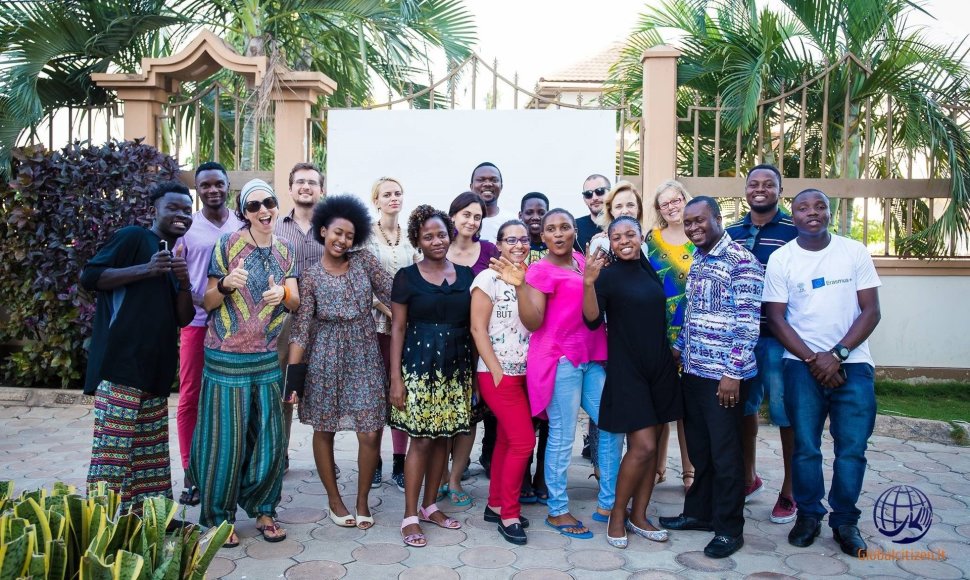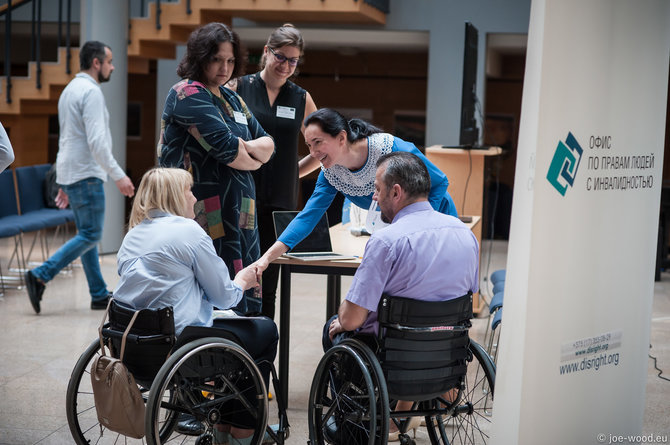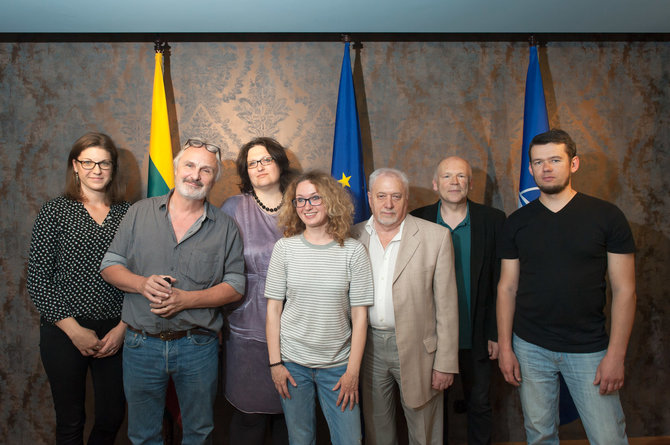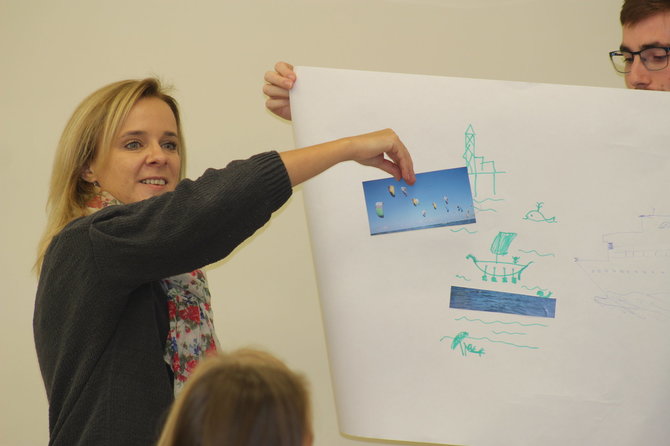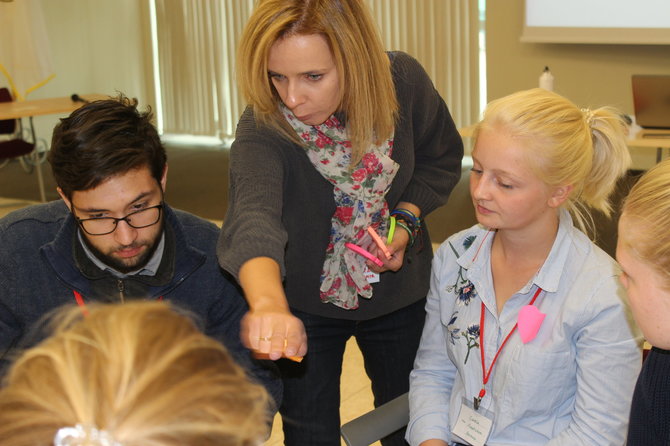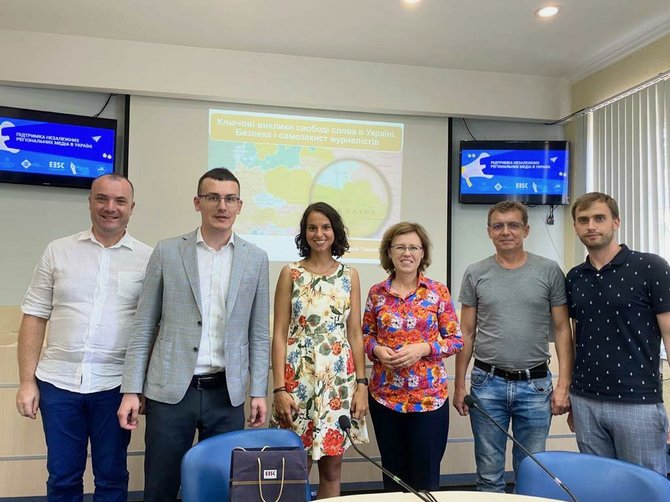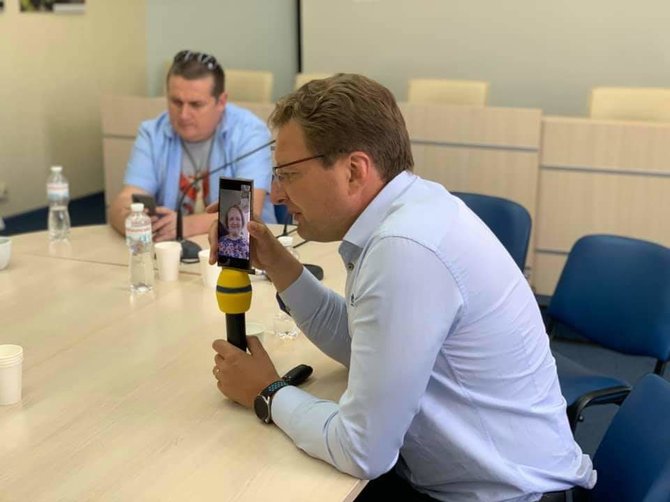Ugnė Grigaitė, project manager, Mental Health Perspectives
“Established in 2000, our organisation has implemented more than 60 national and international projects. Our activities include research, analysis, trainings, advocacy, human rights monitoring, and participation in policy-making; additionally, we promote the bio-psycho-social approach to mental health that is person-focused and based on human rights. Our work is grounded in the principle of human rights indivisibility. We acknowledge that human rights violations harm the mental health not only of individuals but also the society as a whole.
We aim to use foreign best practices and adapt them to the Lithuanian context, including developing new community services. We participated in the successful development of innovative services, such as the Vilnius psycho-social rehabilitation centre RASTIS (2001), Centre for Eating Disorders (2001), Crisis Intervention Department at the Vilnius Centre for Mental Health (2004), and Crisis Management Centre (2015). We also provided expert knowledge for the development of the Act on Crisis/Mindletic smartphone app (2020).
In the development cooperation field, we are moving in the same direction. Over the last six years we were mostly working in Belarus and Ukraine, cooperating with local partners and NGOs with the aim to encourage transition from the segregation-based institutional care-home model to a diversity of community services, while at the same ensuring and protecting the rights of people experiencing difficulties with their mental health, as well as people with psycho-social and/or intellectual disability. Our organisation also monitors the implementation of the UN Convention on the Rights of Persons with Disabilities in Lithuania as well as in our development cooperation projects. In terms of values, this Convention is the basis of our work and the work of our development cooperation partners, as it clearly identifies international human rights standards that form the direction and the themes of our work.
In my opinion, best practices in development cooperation projects are always to do with partnerships, team work, learning about cultural differences and learning from each other, as well as sharing examples of good practices from different countries and varying social and cultural backgrounds.
One of such truly inspiring experiences for me happened in Belarus, where we were implementing one of our projects. Thanks to the huge advocacy efforts by our local partner organisation Офис по правам людей с инвалидностью, in 2016 Belarus finally ratified the UN Convention on the Rights of Persons with Disabilities. Of course, it wasn’t solely the outcome of our advocacy project, but I am absolutely sure that that project provided our local partners with more opportunities, tools, confidence and some sort of power to achieve this victory for human rights. Unfortunately, recently this partner organisation was liquidated, together with many others, by the Belarusian regime. Yet in spite of that, we maintain connection with our colleagues and hope that it will be figured out how to move forward in order to protect and ensure the rights of the most vulnerable groups in Belarus.
Right now we are about to conclude our “mini-project” series in Ukraine, which is part of our larger project. During this series we empowered six small local Ukrainian organisations to prepare and implement truly innovative mini-projects in the Donetsk and Poltava regions. We were so happy and inspired not only by the perseverance and professionalism of these small, financially lacking, understaffed organisations that are so far away from the capital city, but also by their limit-pushing creativity in developing new community services aimed at people with psycho-social and/or intellectual disability, while at the same time always respecting and protecting their rights.
To be honest, perhaps we are not putting enough effort into presenting our development cooperation work to the Lithuanian public regularly, as the major part of our communication and publicity activities is usually concentrated in project host countries together with local partners and sometimes international networks as well. As these activities are implemented in those countries and therefore their results are most relevant to their societies, information and public discourse is encouraged and pursued mostly on a local level, using various local media channels and social media. However, some information regarding our development cooperation activities is presented on our website and social media channels, and we regularly report to our donors who receive detailed information regarding our projects.
In my opinion, the most important aspect when preparing and implementing development cooperation projects is partnership, and equality and horizontal hierarchy between local and foreign partners. The real strength for development cooperation projects comes from cooperation based on mutual respect, team work, sharing good practices and available tools, and creating new tools and good practices together. And that is also my main recommendation to development cooperation projects: to never betray these principles and their related values.”
Indrė Augutienė, Global Citizens Academy
“For me, development cooperation is first of all solidarity and mutual efforts by people and countries to seek positive changes in their communities. It is exactly how it reflects itself in our work: through our development cooperation activities we seek positive social changes in the non-formal children and youth education both in partner countries and here in Lithuania. To me development cooperation means tantamount efforts to share insights, approaches, experiences, and solutions that could be adapted from one country to another. It is also learning from each other and by doing so, creating a global community that is sustainable, just, and equal for all.
Our organisation takes two directions to achieve this. Firstly, it is important to us to encourage change and share our good practices in children’s non-formal education and youth work with partner countries. Secondly, development cooperation plays a very important role in bringing a more global mindset and perspective into our global education activities with young people in Lithuania.
At the Global Citizens Academy, we take a systemic and continuous approach to our work. Although we as an organisation are mainly project-based, we always try to make sure that all our projects have a logical connection between them, that they are continuous and develop a more long-term dimension.
One of our recent projects called GLOBALAB in Action! brings together partners from four European and three East African countries, so we have participants from Lithuania, Bulgaria, Spain, Greece, Kenya, Tanzania, and Uganda. The main goal of this project is to find ways to encourage young people and empower them to actively engage with civil society work that would contribute to the 2030 Sustainable Development Agenda. In this sense our main activities are capacity strengthening, trainings, and internships, as we share good practices on how to encourage civic activism in young people and to adapt it to the implementation of the 2030 Agenda on a local level. Undoubtedly, the pandemic situation does not help in implementing our activities, however on a local level each partner organisation is putting effort to bring young people together and discover ways to adapt various good practices, methods, and tools to encourage civic activism in young people.
Another project, titled CARE WHAT YOU(TH) WEAR!, deals with problems and challenges in the textile industry and is aimed at specialists working directly with youth. The aim here is to create methodological-pedagogical tools that could be integrated into various global education activities both in Lithuania and in our partner countries. This project is implemented with partners in Europe and Asia, namely organisations from Lithuania, Italy, Greece, Nepal, and the Philippines. We want these methodological-pedagogical tools for youth work that we ourselves will create, be based on real-life stories from partner countries, dwelling into topics such as what happens in the cotton growing phase, problems with consumerism, challenges in the clothing production sector, and others. Through the implementation of various capacity-strengthening activities, we are planning to have a methodological publication and very concrete practical tools, based on the realities of our partner countries and responding to the needs of young people in each partner country. Again, the pandemic does not allow us to smoothly run our project activities, since most of them are based on international mobility. I have to admit that informal education activities cannot always be transferred to the remote digital sphere, no matter how much we seem to be advanced in our digitisation processes. I sincerely hope that in the near future we will be able to successfully continue these activities.
The work of the Global Citizens Academy mostly focuses on global education and its enlargement, as well as adaptation of its methods both in Lithuania and in our partner countries. We founded this Academy seven years ago with the aim to expand global citizenship education in the sphere of non-formal education for children and youth. It is of high importance to us that through our global partnerships with East African and Asian partners we transmit global values such as solidarity and respect for nature and human rights to the non-formal education in Lithuania. It is also very important to encourage the development of global education methods in our partner countries through our development cooperation activities.
Analysing the general situation of global education in Lithuania, I’d like to highlight several things. Although global education is slowly gaining access to Lithuanian schools and non-formal education and youth work, I must admit that these efforts are still very much fragmented and not always sustained. At the moment Lithuania is experiencing one of those seemingly never-ending educational reforms, general education curricula are being updated. We presented many proposals to the Ministry of Education, Science and Sport on how the global dimension could be improved and global topics could be integrated into civic education classes in schools. But the answer from the Ministry that we received was this: they said that global citizenship is a “philosophical category” and that the Ministry does not intend to cultivate “global citizens” with its programmes. Such a message from the Ministry is sad and disappointing, but it is not surprising. Unfortunately, patriotism and love for one’s country is still often put in opposition to global topics, even though, being completely honest, I don’t see any opposition between these two thing at all. I can only express my disappointment that various political currents see it.
Despite all of this, I see a lot of great individual initiatives in schools. During our activities with schools we witness the fact that global education is very relevant to students and teachers alike. It is a way to bring today’s realities to school life, things that have importance to contemporary young people. In spite of all the opposition and scepticism felt at the systemic political level, I believe it is incredibly important to work in this field and to pool together at least individual efforts. That is why we continue going in this direction as much as our capacities and opportunities allow us.
Another crucial aspect is that global education plays a very important role in strengthening public support for development cooperation activities. As we saw in our own research conducted in 2020, there is no correlation at all between public information campaigns implemented by state institutions on sustainable development and development cooperation, and public support to development cooperation and efforts to promote sustainable development. After analysing the data from the last several years, we saw that as funding for informing the public increases, public support for development cooperation decreases, and vice versa (this funding comes from the Development Cooperation and Democracy Promotion Programme, which is managed by the Ministry of Foreign Affairs and the Central Project Management Agency). Observing the actual events that took place in a given year we came to the conclusion that public support for development cooperation or humanitarian aid increases immediately after with a major crisis. Therefore public support increases despite whether or not funding for informational campaigns increases. It is clear that public support depends on completely other factors and it is therefore of extreme importance to strengthen public awareness of global problems. One of the best tools to do that is global education.
Beatričė Narbutaitė, Eastern Europe Studies Centre
Here at the Centre our development cooperation focus is on bilateral assistance projects. As per our mandate, we carry out bilateral cooperation with Eastern Partnership countries.
In 2017-2018 we carried out a development cooperation project in Moldova and Georgia titled “Responsible Journalism School”. Recently we presented a funding application for a project titled “Promoting connections between Lithuanian and Belarusian expert communities” and soon we will sign the contract. Due to the current political situation in Belarus and the active engagement of this country’s civil society as well as the international community’s attention to it, we at the Eastern Europe Studies Centre recommend further development of this sphere. In this case priority areas could be: projects that support and train civil society actors; work with independent media representatives; projects to integrate Belarusian nationals after their arrival in Lithuania; publication of analytical studies and reports.
Currently we are implementing a development cooperation project in Ukraine under the title “Support for independent journalism in Ukrainian regions”, and recently we had our first training in Kiev. A huge advantage and long-lasting value for this event was the fact that it took place live, in-person, face-to-face. We have learned from the pandemic situation to plan our live activities for the summer months and even postpone them, if needed, in order to be able to have them live. After many long months of online-only activities people are experiencing what is now called the “zoom fatigue”; online events are having less and less value, because people are less engaged. In our project we paid attention to this factor accordingly, because our goal is not only to provide expert knowledge but also to create conditions for networking and contact-making, sharing experiences and generating new ideas, all of which is best achieved with real, personal contact. As shown by our experience and feedback from our previous project participants, live personal contact is a much more effective method for training and communication, because it helps maintain the participants’ focus more effectively, is much more motivational and provides opportunities to informally cooperate with one another.
It is also very important to allow both the project participants and organisers to evaluate project outcomes and possible effects. That is why, if an opportunity arises, time should be given for potential project participants themselves to define problematic areas; having concluded the project relevant feedback should be gathered which would help assess the effectiveness of project activities, its programme, and impact on the participants.
During the implementation of a project and all its key phases we produce press releases which we then publish in Lithuanian media portals, EESC social media channels, and media in our partner countries. No doubt, in all our project-related articles, press releases, invitations, and publications we always note that the project was financed by the Development Cooperation and Democracy Promotion Programme of the Ministry of Foreign Affairs.
If there is content created in a specific project, or it involves training on content-creation, it is very important to include into the programme the condition that project participants must share that content in their local community or country. Additionally, the EESC controls a wide contact list that includes Lithuanian government institutions, academia, journalists, experts, and other public actors. The EESC regularly informs partners with our production which can also present material created during our projects. We also cooperate with Lithuania’s top media platforms which can also be included in the dispersion of our content.
This article has been prepared by the Lithuanian Development Cooperation Platform, an umbrella organisation with more than 20 member NGOs active in the development cooperation field. All the NGOs described in this article are members of the Platform.
